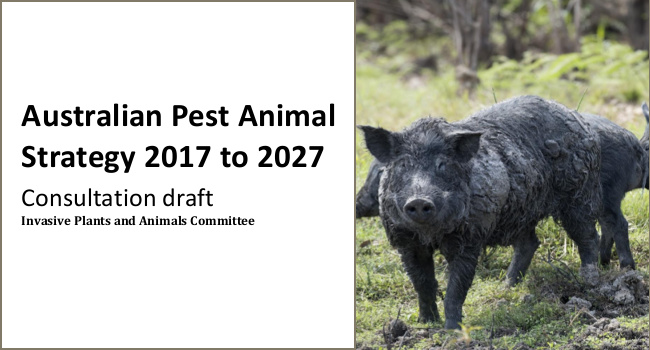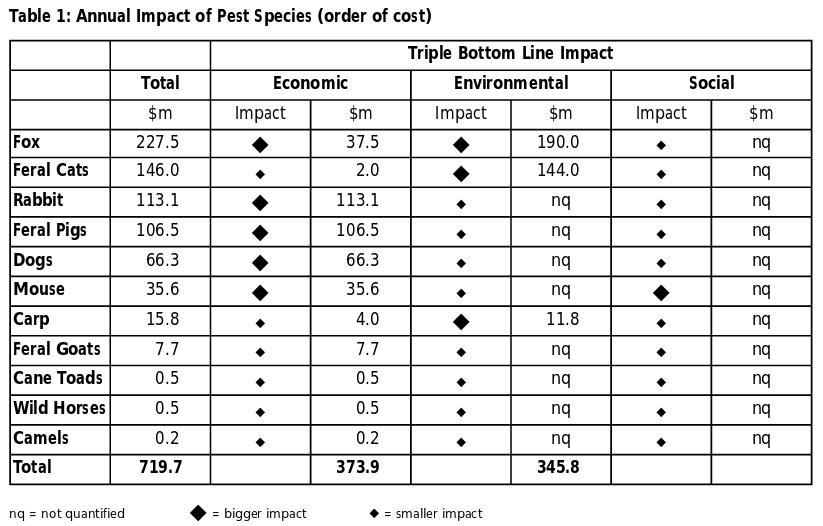
Animals we commonly classify as 'pests' are in fact individual, sentient beings with likes, dislikes, wants, needs and emotions. This principle forms the basis of Vegan Australia's submission to a recent inquiry into 'pest' animals carried out by the Australian Department of Agriculture. Read the full submission below.
Vegan Australia is pleased to have the opportunity to provide a submission in response to the draft Australian Pest Animal Strategy 2017 to 2027 published by the Department of Agriculture and Water Resources. We hope this submission assists the Department in preparing the final strategy.
Vegan Australia is a national organisation that informs the public about animal rights and veganism and also presents a strong voice for veganism to government, institutions, corporations and the media. Vegan Australia envisions a world where all animals live free from human use and ownership. The foundation of Vegan Australia is justice and compassion, for animals as well as for people and the planet. The first step each of us should take to put this compassion into action is to become vegan and to encourage others to do the same. Veganism is a rejection of the exploitation involved in commodifying and using sentient beings.
This consultation provides an opportunity to reflect on the mistreatment of animals in the name of 'pest' control. The proliferation of non-native species in Australia is a complex problem, yet a simple 'solution' is often presented: we must kill the 'pest' animals. This 'solution' causes a great deal of suffering and harm to the animals targeted and native animals that are victims of poorly targeted efforts. Furthermore, lethal 'solutions' are frequently ineffective, and often exacerbate the ecological harm.
In this submission, Vegan Australia will put forward the case that animals, whether of native or introduced species, deserve our respect. Further, it will be argued that phasing out animal agriculture will significantly help efforts to minimise the impact of introduced species, and allow resources to be directed to where they are needed most. Finally, it will be argued that lethal methods of 'pest' control should be phased out in favour of humane, evidence-based, methods.
Vegan Australia stresses that the animals we commonly classify as pests are individual, sentient beings with likes, dislikes, wants, needs and emotions like any other animal, human or non-human.
Few people need to be convinced of the emotional and cognitive capacities of dogs or cats, yet there is a substantial gulf between how individual dogs and cats are treated in the home and how they are treated when designated pest status. Cognitive and emotional capacities are not limited to dogs and cats. Pigs, both wild and domestic, have well developed personalities and emotions, and live in complex social groups that emphasise elements of play, learning, and empathy between animals (among many other cognitive abilities) 1. Foxes have been observed performing rituals that resemble funerals for fallen friends 2. Rats and mice have keenly developed senses of empathy and studies on both have shown that they will help friends who are in pain, even at cost to themselves 3,4, and rats have even been shown to laugh when tickled 5. Mother goats respond to the cries of their kids even after more than a year of separation 6, and goats are able to recognise members of their group even when they are out of the line of sight 7. Horses use facial expressions to display emotions 8. This is far from an exhaustive list of the research on the cognitive and emotional lives of animals considered pests in Australia, and research is only beginning to uncover the true complexities of what is really going on behind the eyes of the animals with whom we share this country.
It is through no fault of their own that these complex individuals are considered pests; they are merely trying to survive and thrive in their environment as any animal does. The fact that they place an environmental, economic, and social burden on Australia is, instead, the fault of those who introduced them, not the fault of the animals themselves. While Vegan Australia acknowledges that we must work to address these impacts, the burden of suffering should not fall solely upon the animals for our mistakes.
It is the position of Vegan Australia that animal agriculture in Australia should be phased out over the next 10 years. As such, we believe that threats to the economic viability of animal agriculture are not legitimate reasons for 'pest' control. The impact of this position on the Australian Pest Animal Strategy is threefold.
Firstly, a phase out of animal agriculture would significantly reduce both the government and social burden of 'pest' animal management, allowing resources to be focused on threats to the environment. With the exception of foxes, 'pests' that have a significant economic impact do not have a significant environmental impact (see Table 1, below) 9. As long as 'pest' management strategies continue to be focused on economic impacts in general, and the impacts on animal agriculture in particular, it is disingenuous to frame 'pest' management as an environmental issue.

Secondly, it must be recognised that the environmental impact of animal agriculture in general, and livestock grazing in particular, is one of the greatest causes of species extinction. Moreover, the impact of non-native species on species extinction in Australia is magnified by the habitat loss and land degradation that is overwhelmingly caused by animal agriculture 10. It is both hypocritical and counterproductive to focus on the environmental impacts of invasive species while our own actions continue to have a much greater impact on Australia's delicate ecosystems.
Thirdly, the phase out of animal agriculture allows for the rewilding of areas previously cleared for pasture. These pastures provide food for 'pest' animals well in excess of what would otherwise be available, in the form of both pasture and livestock, and are responsible for the population explosion of many of these species. Kangaroos, for example, have thrived in environments where land has been cleared for livestock grazing. The Australian Pest Animal Strategy states that they can be classed as pests in some circumstances 11, however, it is largely due to the land use practices of graziers that this has been allowed to become the case 12. 56% of the Australian continent is currently used for animal agriculture, much of which has been substantially transformed from its native state 13. Far from working to reduce the environmental impact of animal agriculture, the rate of land clearing has been increasing in recent years 14, much of it illegally 15. Ceasing the use of pasture, and subsequent rewilding, would have the dual effect of naturally reducing the population of many 'pest' animals (both native and non- native) in line with historic levels, while strengthening ecosystems against environmental stresses 16.
Therefore, Vegan Australia calls upon the Australian Pest Animal Strategy to advocate for the proposed phase out of animal agriculture over the next 10 years. Doing so would allow the strategy to better allocate resources, strengthen native ecosystems, and naturally reduce 'pest' animal populations.
Vegan Australia calls on the Australian Pest Animal Strategy to promote the use of humane, non-lethal methods of 'pest' control and to work towards eliminating lethal methods of 'pest' control.
Non-lethal methods may be as effective as lethal methods in 'pest' control. Population modelling has shown that, in the long term, sterilisation may be just as effective as lethal methods (see fig 1) 17, while causing significantly less harm to the individual animals.

Sterilisation, used in combination with other non-lethal strategies, such as exclusion and the phasing out of animal agriculture (as discussed above), will likely prove more effective than lethal methods.
Lethal methods of 'pest' control are frequently ineffective and sometimes prove to be counter-productive. One case study found that low-level culling of feral cats in southern Tasmania actually increased the population of cats in the area 18, while a European study found that one-off control programs, even intensive control programs, are ineffective in reducing the population density of red fox 19. Lethal control methods frequently fail to achieve the desired results because they fail to take into account the complexities of ecosystems and 'pest' animal social systems 20. Given these results, Vegan Australia calls for an immediate suspension of lethal 'pest' control programs where they have not been proven to be effective. Failing to do so not only results in the wastage of resources, but also risks exacerbating the problems caused by 'pest' species. Further, we call for a phase out of all lethal 'pest' control programs and replacement with effective non-lethal strategies.
Recreational hunting is both cruel and ineffective, and as such, Vegan Australia believes that it should not only be excluded from any 'pest' control efforts, but be legislated against as soon as possible. Hunters regularly dress up their 'sport' as an environmental service by claiming it helps to control 'pest' animals. However, there is insufficient evidence to support this stance 21, and there is good evidence that in some situations, such activities may make the problem worse (as discussed in the previous paragraph). It must be noted, in addition, that many of the 'pest' species inhabiting Australia were released for the purpose of recreational hunting. While many of these species were released over a century ago, some animals, such as deer, have been intentionally and illegally spread by recreational hunters in recent decades 22. If recreational hunting is allowed to continue, it is impossible to eliminate the risk of hunters further spreading invasive species for the purpose of their 'sport'.
As noted in the draft Australian Pest Animal Strategy, the window of opportunity for the prevention of the introduction of many non-native species has passed. This must not, however, lead to complacency. By preventing the further introduction non-native animal species into Australia, whether intentionally for economic, social, entertainment, or 'sport' reasons, or unintentionally, we can limit future environmental and economic harms.
Traditionally, many Australians have held attitudes towards the control of animals classified as pests that were not only cruel, but also ineffective. This has often been reflected in the policies of governments at all levels. Attitudes, however, are changing. More Australians than ever are seeing the need to treat all animals with compassion. This compassion need not be an impediment to effective control of 'pest' animals. Phasing out animal agriculture can strengthen Australia's ecosystems, reduce the potential for harms of 'pest' species, and increase the resources available for effective environmental stewardship. Using evidence-based non-lethal strategies for 'pest' control can lead us to more effective long-term solutions. The Australian Pest Animal Strategy is a real opportunity to improve the lives of animals while simultaneously safeguarding our unique and fragile ecosystems.
Tim Westcott
Vegan Australia

© Vegan Australia | Registered as a charity by the ACNC | ABN 21 169 219 854